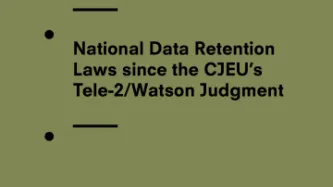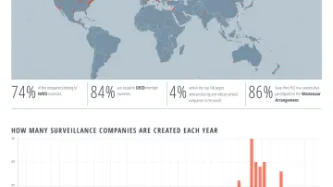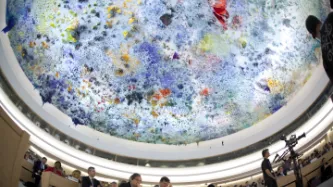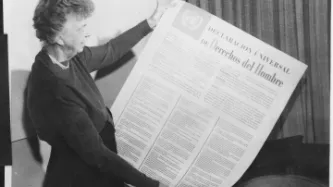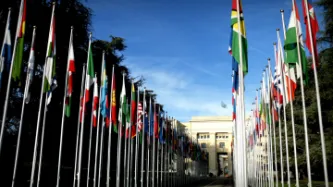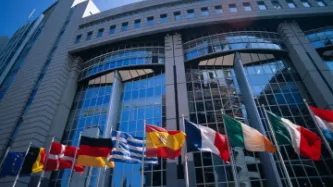Search
Content type: Press release
Key points
Privacy International surveyed 21 EU member states' legislation on data retention and examined their compliance with fundamental human rights standards
0 out of the 21 States examined by PI are currently in compliance with these standards (as interpreted in two landmark judgements by the Court of Justice of the European Union: Tele-2/Watson and Digital Rights Ireland)
Privacy International is calling for:
EU member states to review their legislation on data retention…
Content type: Advocacy
This report sheds light on the current state of affairs in data retention regulation across the EU post the Tele-2/Watson judgment. Privacy International has consulted with digital rights NGOs and industry from across the European Union to survey 21 national jurisdictions (Austria, Belgium, Bulgaria, Croatia, Cyprus, Czech Republic, France, Germany, Hungary, Ireland, Italy, Luxembourg, the Netherlands, Poland, Portugal, Romania, Slovakia, Slovenia, Spain, Sweden, and the United…
Content type: News & Analysis
What do Honduras, Pakistan, and Switzerland have in common? They are all bound to respect and protect the right to privacy under Article 17 of the International Covenant on Civil and Political Rights. And in July 2017, they all also happened to be under the scrutiny of the UN Human Rights Committee, which found the countries’ human rights record wanting in many respects, including the scope of their surveillance legislation.
Intelligence sharing
Reviewing Pakistan, the Committee…
Content type: Press release
Please find attached a copy of the briefing along with promotional photographs with the briefing.
Privacy International has today sent top EU and UK Brexit negotiators* a briefing on their vulnerability to potential surveillance by each other, and others. Brexit negotiations are to begin today.
The global privacy rights NGO has highlighted to the negotiators the risk of sophisticated surveillance capabilities being deployed against each other and by others, and provided…
Content type: Examples
French spy agency Direction Générale de la Sécurité Intérieure in December 2016 for 10 million euros signed a contract buying access to Palantir’s Gotham software. French politicians have voiced concerns over the software as France pushes to become more technologically independent.
Publication: EU Observer
Date: 9 June 2017
Content type: News & Analysis
Dear Minister Dr. Wolfgang Brandstetter, Minister Mag. Wolfgang Sobotka, Minister Dr.in Pamela Rendi-Wagner, MSs, Minister Mag. Hans Peter Doskozil,
Privacy International is a United Kingdom-based non-governmental organization, which is dedicated to protecting the right to privacy around the world. Privacy International is committed to ensuring that government surveillance complies with the rule of law and the international human rights framework. As part of this commitment, Privacy…
Content type: Press release
Privacy International has today published an investigation, which sheds light on the shady deals that built Syria’s surveillance state and the role Western companies have played in its construction. The investigation also shows how Western surveillance companies seek to exploit loopholes to do business with repressive states.
Key points:
Technical specifications acquired by Privacy International reveal the Syrian government’s ambitious mass surveillance projects, including a nationwide…
Content type: News & Analysis
This guest piece was written by Elonnai Hickok and Vipul Kharbanda of the Centre for Internet and Society. It does not necessarily reflect the views or position of Privacy International.
In light of the complex challenges and threats posed to, and by, the field of information telecommunications in cyberspace, in 1998 the draft resolution in the First Committee of the UN General Assembly was introduced and adopted without a vote (A/RES/53/70)…
Content type: Long Read
This report examines the emergence of social media based surveillance in Thailand, carried out potentially by people’s own networks of friends and family. It looks at the severe impact this has on personal privacy and points to potential solutions.
In May 2014, Thailand experienced a military coup – its second in eight years. A military government led by General Prayut Chan-o-cha seized power and overthrew the administration of Prime Minister Yingluck Shinawatra. The Army declared martial…
Content type: Press release
New report entitled Global Surveillance Industry maps out growth and scale of global surveillance industry
Privacy International, in collaboration with Transparency Toolkit, launches searchable database featuring over 1500 brochures and data on over 520 surveillance companies as well as over 600 reported individual exports of specific surveillance technologies taken from open source records, including investigative and technical reports, as well as government export licensing data
The…
Content type: News & Analysis
Privacy International is today proud to release the Surveillance Industry Index (SII), the world's largest publicly available educational resource of data and documents of its kind on the surveillance industry, and an accompanying report charting the growth of the industry and its current reach.
The SII, which is based on data collected by journalists, activists, and researchers across the world is the product of months of collaboration between Transparency Toolkit and Privacy…
Content type: News & Analysis
Last month, the UK Information Commissioner's Office announced a “private investigator crackdown”, citing concerns that private investigators were using hacking techniques to gain access to personal information.
The use of dodgy private investigators and illegal hacking by private investigators in the UK has attracted significant media attention in the wake of the phone hacking scandals, which involved the use of such private investigators by major newspapers.
The sector isn't…
Content type: News & Analysis
We already know that in some countries, like the UK, governments are drafting laws to legalise and legitimise their incredible surveillance powers. In the U.S. we are seeing legislation that is using remarkably similar language on encryption and surveillance. The next phase of the cryptowars has openly begun.
Yesterday what is being called the Feinstein-Burr decryption Bill was introduced into the US Senate and leaked online. Whilst the short title ‘Compliance with Court Orders…
Content type: Advocacy
Below is Privacy International’s oral statement to the Human Rights Council 31st ordinary session, 9 March 2016 Inter-active dialogue with the UN Special Rapporteur on the right to privacy. Privacy International's written statement is here.
BEGIN
Mr. President,
Privacy International welcomes the opportunity to participate in this first inter-active dialogue with the Special Rapporteur on the right to privacy. We regret however the Rapporteur’s late submission of his report.…
Content type: News & Analysis
This week will see the right to privacy take center stage at the UN in Geneva.
The UN Special rapporteur on the right to privacy will present his first report to the UN Human Rights Council on Wednesday 9 March. Meanwhile the Human Rights Committee will review the records of surveillance and the right to privacy of South Africa and Sweden among others.
The new Special Rapporteur on the right to privacy
A year ago the Human Rights Council established the mandate of the Special…
Content type: News & Analysis
In 2015 the United Nations' human rights mechanisms significantly increased their capacity to monitor and assess states' compliance with their obligations around the right to privacy. Notably, the Human Rights Council established the mandate of the Special Rapporteur on the right to privacy, filling a significant gap in the international human rights protection system. Meanwhile, the Human Rights Committee put surveillance laws and practices in a range of countries under close scrutiny, making…
Content type: News & Analysis
Today the Grand Chamber of the Court of Justice of the European Union ruled that mass surveillance is in violation of the right to privacy and that a legal system that provides no legal redress against interference with someone's privacy falls short of EU human rights standards.
The Court was seized following a complaint initiated by Mr Schrems to the Irish Data Protection Commissioner about the transfer of his Facebook data from Ireland to the US under the now defunct “…
Content type: News & Analysis
Today Privacy International together with other international human rights organisations call on the French parliament [PDF] to reject a bill on international surveillance, which, as it is currently worded, fails to protect and respect the right to privacy of individuals worldwide.
In June this year, the French parliament passed a law regulating the work of the intelligence services that will greatly undermine the privacy of French residents. Soon after, the French…
Content type: Press release
In yet another blow to the UK’s surveillance proponents, the UN Human Rights Committee has criticised the British legal regime governing the interception of communications, observing that it allows for mass surveillance and lacks sufficient safeguards.
The latest in a series of calls for wholesale reform of surveillance laws and practices in Britain, and following on the footsteps of reports by the Independent Reviewer of Terrorism Legislation David Anderson QC and Royal United Services…
Content type: Advocacy
This stakeholder report is a submission by Privacy International (PI). PI is a human rights organisation that works to advance and promote the right to privacy and fight surveillance around the world. PI wishes to bring concerns about the protection and promotion of the right to privacy in France before the Human Rights Committee for consideration in France’s upcoming review.
Content type: News & Analysis
The Coalition Against Unlawful Surveillance Exports (CAUSE) has today released a new policy paper calling on the EU to take the opportunity to update its Dual Use Regulation to ensure that surveillance technologies are not exported from Europe and used for human rights violations.
The proposals have been developed by the international secretariat of CAUSE, a coalition of NGOs consisting of Access, Amnesty International, Digitale Gesellschaft, Human Rights Watch, the…
Content type: News & Analysis
A groundbreaking report released today by the UN Special Rapporteur on freedom of expression, David Kaye, calls on states to ensure security and privacy online by providing “comprehensive protection” through encryption and anonymity tools, warning that blanket measures to restrict online privacy fail to comply with human rights norms.
To support the findings contained in the Special Rapporteur's report, Privacy International, the Harvard Law School's International Human Rights Law…
Content type: Press release
Governments must accept they have lost the debate over the legitimacy of mass surveillance and reform their oversight of intelligence gathering, Privacy International and Amnesty International said today in a briefing published two years after Edward Snowden blew the lid on US and UK intelligence agencies’ international spying network.
“The balance of power is beginning to shift,” said Edward Snowden in an article published today in newspapers around the world. “With each court victory,…
Content type: Press release
Privacy International, Amnesty International, FIDH, the French League for Human Rights and Reporters Without Borders are alarmed by the expansive surveillance powers to be granted to surveillance agencies contained in a Bill transferred to the French parliament on Friday. Under the new law, French intelligence agencies would be empowered to hack into computers and devices and spy on the communications of anyone who makes contact with a person under suspicion, even incidentally. The new law will…
Content type: News & Analysis
The French Government unveiled a new Bill that aims at providing a legal framework to intelligence services last Friday. While Privacy International welcomes the positive step of placing powers that were until now poorly regulated under the law, we remain alarmed by many aspects of this Bill. Two months after the deadly terrorist attacks in Paris that targeted the satirical weekly Charlie Hebdo and a Kosher supermarket, the Government seeks to provide the intelligence services with a…
Content type: News & Analysis
German surveillance technology company Trovicor played a central role in expanding the Ethiopian government's communications surveillance capacities, according to a joint investigation by Privacy International and netzpolitik.org.
The company, formerly part of Nokia Siemens Networks (NSN), provided equipment to Ethiopia's National Intelligence and Security Service (NISS) in 2011 and offered to massively expand the government's ability to intercept and store internet…
Content type: News & Analysis
The following was written by Mike Rispoli, Communications Manager at Privacy International, and appeared in the 'Journalism in Europe' discussion series, hosted by Central European University:
"The response by world leaders to the horrific terrorist attacks in France earlier this month has been all too familiar. As officials rallied for freedom of expression, they called for increased vigilance against extremists by expanding government surveillance powers.
Leading the way is UK Prime…
Content type: News & Analysis
In the wake of tragic attacks in France, politicians from across the world are calling for dramatically expanded surveillance powers, to spy on our phonecalls, ban encrypted communications such as WhatsApp and iMessage, and store details about our international travels for years on end.
If it feels like you've heard this story before, it's because you have. With each violent attempt by extremists to terrorise society, our political leaders dust off old, failed proposals such as the UK…
Content type: Press release
Privacy International, Reporters Without Borders, Digitale Gesellschaft, FIDH, and Human Rights Watch welcome news that the European Commission will move ahead and add specific forms of surveillance technology to the EU control list on dual use items, thus taking steps to finally hold companies to account who sell spy equipment and enable human rights abuses.
These important steps demonstrate that policymakers are beginning to wake up to the real harm that exists…
Content type: News & Analysis
The European Union’s privacy and data protection laws are some of the strongest in the world. And the privacy-related activities of the last European Parliament (2009-2014) have been the most intense in its history. For half of its term it steered the highly-debated data protection law reforms, with a first plenary vote cast in the nick of time before it dissolved last April. And for the last year it dealt with the fallout of the mass surveillance revelations by Edward Snowden, which…
